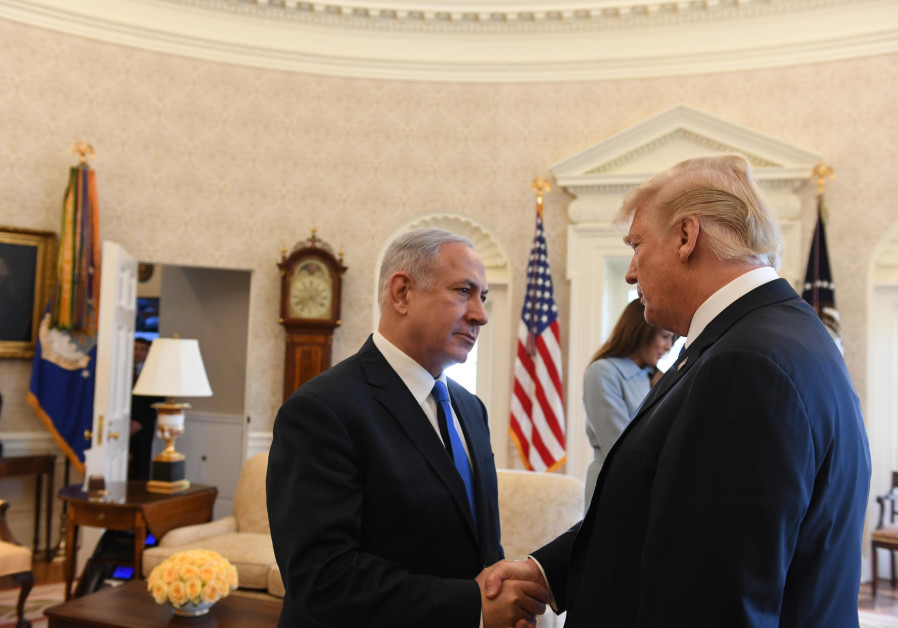The probes of Netanyahu and Trump: Who might be first to go?

Prime Minister Benjamin Netanyahu shaking hands with US President Donald Trump at the Oval Office . (photo credit: HAIM ZACH/GPO)
Neither US President Donald Trump nor Prime Minister Benjamin Netanyahu will be forced from office in the immediate future.
But as their legal troubles heat up, the question arises: Whose seat may be in jeopardy sooner?
There’s no question that Trump took a hit on Tuesday with the conviction of his former campaign manager Paul Manafort and with his personal lawyer Michael Cohen implicating him as a co-conspirator to cover up alleged marital affairs – including by violating campaign financing laws.
These body blows fell into place as the US Office of Special Counsel investigation is at an advanced stage. All of this, plus the fact that several former Trump officials have already been convicted, could suggest that Trump is in more imminent danger of losing power.
But this would ignore the crucial legal differences between Israel and the US.
The US presidency is conceptually built on the idea of a reduced kingship. In that way, the president has several independent powers – including, crucially, the power to pardon – that the Israeli prime minister does not have.
In Israel, the president, who otherwise is mostly a figurehead, has the extraordinary power to pardon.
In that light, the legal obstacle to trying to prosecute Trump is that the majority view holds a sitting president cannot be indicted while in office. How can you prosecute the official who holds the power to pardon?
(function(w,d,s,i){w.ldAdInit=w.ldAdInit||[];w.ldAdInit.push({slot:10834723912266086,size:[0, 0],id:”ld-9628-9059″});if(!d.getElementById(i)){var j=d.createElement(s),p=d.getElementsByTagName(s)[0];j.async=true;j.src=”//cdn2.lockerdomecdn.com/_js/ajs.js”;j.id=i;p.parentNode.insertBefore(j,p);}})(window,document,”script”,”ld-ajs”);
There is a minority group of legal scholars who contest this, but overall it likely means that to prosecute a sitting president, he must first be impeached.
Only a vote by both houses of Congress, including a two-thirds vote in the Senate, can lead to impeaching a president, and the grounds are “treason, bribery or other high crimes and misdemeanors.”
Even if all political parties were totally objective – and no party is going to help impeach a president from its side unless it feels there is no choice – it is far from clear whether the Cohen campaign finance allegations against Trump would reach that high standard.
Being realistic, while some predict that the Democrats may retake the House of Representatives, the chances that the Democrats will take the Senate are much lower.
The chances that the Democrats could get enough Republican senators to vote to impeach Trump based on the Cohen charges are practically zero.
Probably the only issue in play that might move Republicans would be proof of crimes relating to Trump himself colluding with Russia.
While Manafort was convicted, and while there are increasing hints that the special counsel may yet have proof of Trump colluding with Russia – or of Trump obstructing the probe into possible collusion with Russia – at least for now, the special counsel has not made a case against Trump for collusion.
There may still be further revelations, and all of these criminal issues could be a problem for Trump’s reelection. But as things stand, he would not face prosecution before early 2021 – and that would only be if he loses the election.
In mid-June, The Jerusalem Post exclusively reported that Attorney-General Avichai Mandelblit will announce an intention to indict Netanyahu for bribery in the Bezeq-Walla affair by the end of 2018 or early 2019. He may also indict Netanyahu in the illegal gifts affair, though the chances of an indictment in the Yediot Aharonot-Israel Hayom affair are lower.
There are questions about whether Netanyahu can be forced to resign under indictment like other ministers or whether he must be convicted, but there is no obstacle to indicting or convicting him, as there is with indicting Trump.
Join Jerusalem Post Premium Plus now for just $5 and upgrade your experience with an ads-free website and exclusive content. Click here>>






Comments are closed.